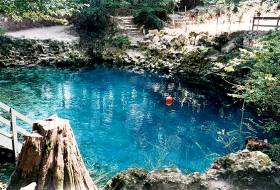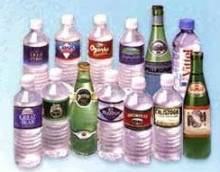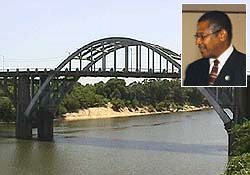|
by JACK LYNE, Site Selection Executive Editor of Interactive Publishing
ROANOKE, Va. — It's a project with a little slice of Horatio Alger (along with his brother), industriously climbing up from the bottom - or the basement, actually, to be more precise.
by JACK LYNE, Site Selection Executive Editor of Interactive Publishing
MADISON COUNTY, Fla. — Nestle Waters North America broke ground last week for a new $120-million, 300-employee Deer Park bottled-water plant in rural Madison County, Fla.
by JACK LYNE, Site Selection Executive Editor of Interactive Publishing
DALLAS COUNTY, Ala. — Alabama's economically challenged "Black Belt" has some sweet site-selection news to chew on: American Gum Company is coming to Dallas County, Ala., with a 350-employee plant.
Atlantic Credit & Finance, humbly born in a basement in 1996, is moving into larger new digs in Roanoke, Va., and adding 226 jobs - an eye-popping 151 percent increase in its total work force.
Two hometown boys - founding brothers Richard and Kelly Woolwine - have turned today's mounting gob of bad debt into Atlantic Credit's hot ticket. Last year, the rags-to-riches company bagged US$22 million in revenue, almost doubling 2001's tally of $12.2 million. That robust showing, in fact, landed Atlantic Credit in the No. 16 spot on Inc. magazine's 2002 list of the fastest-growing U.S. private companies.
And the Woolwine brothers are expecting yet more jackrabbit growth in 2003. And that, in turn, translates into a need for more employees and a larger swath of space.
Atlantic Credit is meeting both needs by moving its 150 existing workers into leased space in a Roanoke office building that was once occupied by Litton Communications. The company is investing $8.5 million in its lease, building renovations and new equipment, said Kelly Woolwine, Atlantic Credit's 36-year-old president.
"We are pleased to expand our business and create new jobs here in the Roanoke Valley, where we grew up," he said.
Entrepreneurs by Night
"This is a good example of the fertile ground the Roanoke Valley offers companies of all types and sizes," said Philip Sparks, executive director of the Roanoke Valley Economic Development Partnership, which markets Botetourt, Craig, Franklin, and Roanoke counties, as well as the cities of Roanoke, Salem, and Vinton. "Richard and Kelly Woolwine could have chosen to locate their company anywhere, but chose to make a commitment to the local work force."

In point of fact, the homegrown Woolwine boys actually chose to start their company somewhere else - a strategy mothered in part by necessity.
The basement in which they created the firm was in northern Virginia, inside the home of yet another Woolwine brother, Steve. Both college grads, Richard and Kelly Woolwine by night worked food-service jobs; by day, they used their brother's basement as the subterranean spawning ground for their entrepreneurial dream.
The odds looked improbable, but the business took off. And with that, the brothers discovered that they had a hankering to return home.
Their hometown labor pool has helped make the two prodigals' return highly successful, said Richard Woolwine, Atlantic Credit's 43-year-old CEO. "We're extremely satisfied with the quality of the work force in the Roanoke Valley," he explained.
The local work force is likely just as pleased with the quality of the jobs that the Woolwines have brought back home. Atlantic Credit's employees work exclusively on the phone; their pay potential, however, dwarfs many traditional call-center positions. The company's phone reps can earn up to $50,000 a year in base salary and performance incentives, Richard Woolwine said.
But while the debt it buys is bad, Atlantic Credit's approach is much more "good cop." Employees phone bad debtors and offer to negotiate payments, the Woolwine brothers explained. Reps suggest options that can include flexible payment plans, a possible reduction in total debt and the renovation of debtors' credit records.
Atlantic Credit has improved its success odds in an often chancy business by employing a proprietary statistical model. The company uses the model to determine exactly which delinquent accounts it wants to purchase, the Woolwines say. Analyzing specific debts with the technology provides Atlantic Credit with a profile to gauge its chances of recouping all or part of the debt.
Ironically, the Woolwines used their own personal credit cards as part of the payment in buying the basement-based company's first credit-card debt. The fledging firm's success kept that paid-with-plastic outlay from sliding into the same bad-debt pool that the brothers are now profitably navigating.
This time out, though, the brothers are getting a little help from their home-state friends. The Virginia Department of Business Assistance's Work-Force Services Program, is providing a $150,000 grant for training the Woolwines' wave of new employees.
American Credit plans to move into its new quarters later this summer.

Debate-Dogged $120-Million, 300-Worker Plant
The groundbreaking clearly marked the official kickoff for the decidedly large project. But just as clearly, it didn't manage to bottle up some decidedly vocal opposition.
The rippling debate in northern Florida reflects a larger national trend. Bottled water has rapidly emerged as one the hot buttons in the locational land of NIMBY - Not in My Backyard. Bottled-water plant opponents are aggressively asserting that such facilities threaten to dry up and environmentally damage their streams, wells and wetlands.
Located some 60 miles (96 kilometers) east of Tallahassee, Nestle Waters' Madison County plant will tap into Blue Spring near the city of Madison. One of the state's largest springs, Blue Spring has an average flow of 68 million gallons (258 million liters) a day.

Nestle Waters has acquired a state permit allowing it to pump a daily average of 1.47 million gallons (5.59 million liters) from Blue Spring. That water will be the essential raw material for the plant, located on a 202-acre (81-hectare) site that Nestle has purchased. The water, though, will actually come from another two-acre (0.8-hectare) site that Nestle purchased about one mile (1.6 kilometers) away, where the company will install a well to tap its Blue Spring allotment.
The bottled-water industry now has annual worldwide sales topping $35 billion according to the Beverage Marketing Corporation (BMC), an industry research, consulting and financial services firm. U.S. bottled-water sales now top $6 billion a year, according to BMC data; that's three times higher than 10 years ago, with U.S. per-capita consumption now averaging 21.2 gallons a year. And by 2004, bottled water will supplant not only coffee, but milk as well, as the No. 2 best-selling U.S. commercial beverage, trailing only soft drinks, BMC projects.

Nestle Waters North America is riding high atop that wave of washed-down water. The company last year was the largest U.S. bottled-water business in total dollar sales, with five of the top 10 best-selling brands (No. 3 Poland Spring, No. 4 Arrowhead, No. 6 Deer Park, No. 8 Ozarka and No. 9 Zephyrhills).
Ostensibly, communities landing part of the U.S. bottled-water production surge are reeling in an economic development boon.
Madison County economic development officials certainly thought so. The Nestle plant, they pointed out, will create 300 jobs without some incoming industries' attendant air and water pollution. And Nestle's new positions will "offer full benefits with health and dental insurance and 401k plans," John Nowacki, tapped as Madison County plant manager, said at the groundbreaking.
Cities and agricultural and industrial operations are all tapping the Floridian Aquifer for local-area drinking, irrigation and operations. Bottling water for consumption somewhere else, though, has hit a nerve in parts of the American body politic.
Some Madison County residents, for example, have voiced concerns that the Nestle's plant will exacerbate the Florida drought's impact on the Suwannee River (into which Blue Spring flows). More Gulf of Mexico saltwater could then move up river, harming freshwater plants, the say. Residents near the plant site have voiced more traditional traffic and noise concerns.
Except Nestle Plant' Draws Fire
The far bigger dustup, though, is over the state's $1.3-million grant to Madison County from the Florida Economic Development Transportation Fund to build a road to the plant from State Road 6.
The grant has drawn strong criticism from a local newspaper, The Madison County Carrier. The paper recently opined that "the taxpayers in Madison County were denied the information that Nestle was seeking this grant requiring taxpayers to pay for a road going nowhere except to the Nestle Plant. . . . Nestle is a company that has publicly stated numerous times that they are willing and able to pay for their own road, and they are eager to come to Madison County without any such incentive."
Nestle Waters officials, however, asserted that the road was a significant factor in the company's choosing Madison County over a Virginia site. And the state road fund is clearly defined as "an incentive tool designed to alleviate transportation problems that adversely impact a specific company's location or expansion decision."
The state road fund is a major recruiting tool, said Madison County Economic Development Council Executive Director Keith Mixon.
"Without the road fund , there are some projects that would not happen in Florida," he told Site Selection. "We expect 300 trucks a day in and out of that site. In three years, that plant, if the projections are accurate, will total 1 million sq. ft. (90,000 sq. m.) In a county like Madison, that's a miracle."
(The state road fund was also a key in the state's landing two projects -Lowe's $73-million, 600-job distribution center in Osceola County and Wal-Mart's 600-job regional distribution center in Alachua - that will also be part of Site Selection's Florida Spotlight in the September issue.)
The Madison County plant is already under the environmental purview of the Suwannee River Water Management District, formed in 1999 as a coalition of state, federal and regional agencies, local governments and private industry representatives to collaboratively reduce nitrate levels. The district is requiring Nestle Waters to monitor both Blue Spring and the Withlacoochee River for any signs of environmental damage. If any environmental harm is detected, district officials are authorized to cut the company's pumping allotment.
In addition, unlike several other Florida springs now pumped by bottled-water operations, the Nestle plant won't block public access to Blue Spring. The spring will remain open to all, Nestle officials say. (The state also operates Blue Spring Park in Madison County.)
By comparison, some other states' bottled-water debates have hit far higher decibel levels.
In Michigan, for example, the Sweetwater Alliance organized "no-shop days" in all supermarkets carrying bottled water made by Ice Mountain, a Nestle subsidiary. In stores that refused to remove the product, protesters even loaded carts with Ice Mountain bottles, removing them to remote in-store locations and leaving signs on the emptied shelves that read "Our Water Is Not For Sale - Boycott Ice Mountain."
Michigan water rights activists also blocked incoming and outgoing traffic at Ice Mountain's bottling plant in Stanwood, Mich., a year ago. The blockade stopped plant traffic for more than seven hours.
Bottled-Water Industry a Public Utility
A California legislator has introduced a bill that would remove bottled water from the California Food and Drug Branch's regulatory authority. Under the proposal, the industry would instead be regulated as a state public water utility.
"There is no logical public health or public policy basis that would require such a drastic and expensive change in bottled-water regulation," said Stephen Kay, vice president of communications for the International Bottled Water Association (IBWA). The IBWA has its own model code, which is administered through unannounced annual plant inspections by independent third parties.
Back in Florida, Nestle is wisely wearing an environmentally correct face. The company, for example, gave Madison County $20,000 to spend on Blue Springs Park.
And no ground was broken at the new plant's groundbreaking. Instead, Nestle emphasized environmental commitment. Officials watered a tree, which will be planted on the site.

The Ypsilanti, Mich.-based company has purchased an abandoned 36,000-sq.-ft. (3,240-sq.-m.) welding shop on a 22-acre (nine-hectare) site in South Dallas Industrial Park. American Gum will convert the facility into a manufacturing operation, opening as soon as this summer, company officials explained.
The facility will employ as many as 150 workers by next year, they said, increasing employment to 350 workers as it ramps up to full production. Purchase terms for the facility and site weren't disclosed.
Founded in 2002, American Gum is going against part of the U.S. candy-making industry's grain. That industry has accelerated its southward location shift in recent years, increasingly moving more production to Mexico.

The Big Three U.S. candy makers, Hershey Foods, Mars and Tootsie Roll Industries, for example, all have opened large new Mexican plants. Similarly, Brach's Confections this year is closing its long-time manufacturing operation in Chicago and shifting that plant's 1,100 jobs to a Mexican plant that the company is completing in Linares. Part of candy-makers' sweet tooth for Mexico revolves around labor costs, which are often one-tenth of what they would pay in the U.S.
Dallas County, however, had an edge that was based on an earlier setback. American Candy last year closed its plant in Selma (the Madison County seat) as part of its Chapter 11 bankruptcy filing. The availability of those experienced workers was the linchpin in American Gum's location choice, the company said.
"We were so impressed by the dedication and longevity of the American Candy workers," American Gum President Mike Savage explained at the project announcement.
"I feel like I just stepped up into a pulpit," Perkins said from the raised platform set up for the ceremony. "If that is the case, I feel as though I could preach a pretty good sermon today. We're being blessed, and we need to look at it as a blessing."
The community certainly seemed due for a blessing. Of Madison County's some 47,000 residents, 31 percent live below the poverty line. Some 63 percent of the county's population is made up of African-Americans.
The area's economic struggles will also provide some bottom-line benefits for American Gum. The 400-acre (160-hectare) South Dallas Industrial Park is located in the federally designated Renewal Community that encompasses most of the county. As such, the park offers federal tax credits of up to $1,500 for each employee living and working in the Renewal Community, plus accelerated depreciation and the elimination of capital gains taxes on the sale of assets held through 2009. As part of a state Enterprise Zone, South Dallas Industrial Park also provides tax credits and exemptions and other incentives.
Officials haven't yet estimated the total federal and state aid that American Gum's project will receive.
Further cooperative aid for the area's Black Belt materialized in April. Alabama Gov. Bob Riley and Mississippi Gov. Ronnie Musgrove announced their intention to form a regional alliance and an industrial park that will sit on both sides of the state line in the South's Black Belt region. (For further details see the Southeast Spotlight from the July Site Selection.)
The Selma area may be familiar to some from some unflattering publicity that it received on March 7, 1965. That was the date on which black citizens marching to the state capital to push for civil rights were beaten by Alabama state troopers at the Edmund Pettus Bridge.
With the civil rights movement's success, though, Dallas County later sent Alabama's first elected African-American representative to the U.S. Congress. Perkins in 2000 became Selma's first African-American mayor.
 PLEASE VISIT OUR SPONSOR • CLICK ABOVE
PLEASE VISIT OUR SPONSOR • CLICK ABOVE 
©2003 Conway Data, Inc. All rights reserved. Data is from many sources and is not warranted to be accurate or current.
